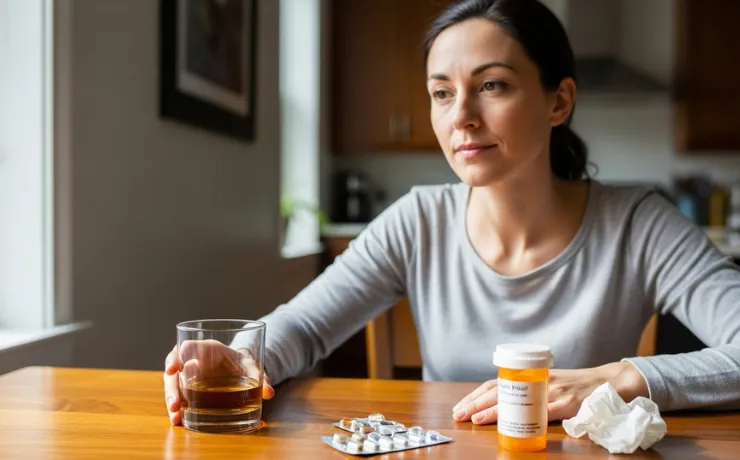The Truth About Mixing Alcohol with Medications

Many people enjoy alcohol socially, but it’s important to understand how drinking can affect medications. Mixing alcohol with medications—even over-the-counter drugs—can increase side effects, reduce effectiveness, or create serious health risks.
At Farmington Drugs, we provide guidance on how alcohol interacts with medications, what to watch for, and how to manage your health safely.
Why Alcohol and Medications Can Be Dangerous
Alcohol can affect the way medications work in several ways:
-
Altered absorption: Alcohol can interfere with how medications are absorbed in the digestive system.
-
Increased side effects: Drowsiness, dizziness, nausea, or stomach irritation may be intensified.
-
Reduced effectiveness: Alcohol may prevent medications from working as intended.
-
Strain on the liver: Both alcohol and many medications are processed by the liver, increasing risk of liver damage.
-
Increased risk of overdose: Alcohol can amplify sedative or depressant effects, leading to serious complications.
Even moderate drinking can pose risks depending on the type of medication.
Medications That Can Interact with Alcohol
Some common categories of medications can be affected by alcohol:
1. Pain Relievers and Anti-Inflammatory Medications
-
Alcohol can increase stomach irritation or risk of bleeding.
-
Combining alcohol with certain pain medications can also increase drowsiness or liver strain.
2. Sleep Aids and Sedatives
-
Alcohol can amplify sedative effects, causing excessive sleepiness, confusion, or respiratory depression.
-
Even occasional alcohol can be dangerous when combined with these medications.
3. Antibiotics
-
Some antibiotics may interact with alcohol, causing nausea, vomiting, or rapid heartbeat.
-
Alcohol can also reduce effectiveness in some cases, prolonging recovery.
4. Mental Health Medications
-
Alcohol can interfere with antidepressants, anti-anxiety medications, and mood stabilizers.
-
Mixing can worsen side effects, impair judgment, and reduce treatment effectiveness.
5. Blood Pressure and Heart Medications
-
Alcohol may interfere with blood pressure control and increase dizziness or fainting risk.
-
Heart medications can be less effective or cause dangerous interactions with alcohol.
Tips for Safe Medication Use
To reduce risks when taking medications:
-
Read labels carefully: Look for warnings about alcohol interactions.
-
Consult your pharmacist: Ask if it’s safe to consume alcohol with your medications.
-
Avoid alcohol during treatment: When in doubt, abstain, especially with new prescriptions.
-
Monitor for side effects: Drowsiness, nausea, dizziness, or unusual symptoms may indicate an interaction.
-
Stick to prescribed doses: Never increase or combine medications with alcohol to enhance effects.
Over-the-Counter Medications and Alcohol
Even OTC medications can interact with alcohol:
-
Cold and flu remedies: Many contain antihistamines or decongestants that can cause drowsiness when combined with alcohol.
-
Pain relievers: NSAIDs or acetaminophen may cause stomach irritation or liver strain if mixed with alcohol.
-
Allergy medications: Can enhance sedation and impair alertness.
Pharmacists can help identify which OTC products are safe and how to use them responsibly.
Lifestyle Strategies for Reducing Risk
-
Plan ahead: Avoid alcohol when starting new medications or if taking multiple prescriptions.
-
Stay hydrated: Water helps reduce side effects like dizziness or nausea.
-
Track medications: Keep a list of all prescriptions, OTC drugs, and supplements to check for interactions.
-
Seek support: Speak with a pharmacist or healthcare provider for guidance on safe alcohol use with your medications.
When to Seek Medical Attention
Consult a healthcare provider or pharmacist immediately if you experience:
-
Severe dizziness or fainting
-
Difficulty breathing or extreme drowsiness
-
Nausea, vomiting, or abdominal pain after mixing alcohol and medications
-
Confusion or disorientation
-
Signs of liver stress, such as jaundice (yellowing of skin or eyes)
Early evaluation prevents serious complications and ensures safe medication use.
The Role of Your Pharmacist
Pharmacists play a critical role in helping patients use medications safely with alcohol:
-
Review your prescriptions and OTC medications for alcohol interactions
-
Advise on safe timing and usage of medications
-
Educate patients on potential side effects and risks
-
Provide alternatives or adjustments if alcohol consumption is a concern
-
Monitor adherence and overall health during treatment
At Farmington Drugs, our pharmacists are available to answer questions, provide personalized advice, and help ensure medications are used safely.
Safety Considerations
-
Avoid guessing: Never assume moderate drinking is safe with any medication
-
Follow label warnings: Alcohol warnings are included for safety reasons
-
Keep alcohol and medications separate: Avoid storing them together to reduce accidental misuse
-
Report unusual symptoms: Always inform your pharmacist or healthcare provider
Final Thoughts
Mixing alcohol with medications can be risky, even with common OTC products. Understanding interactions, reading labels, consulting your pharmacist, and monitoring for side effects are essential for safe medication use.
At Farmington Drugs, our pharmacists provide guidance on safe medication use, identify potential interactions, and offer personalized advice to help patients protect their health while taking medications responsibly.





